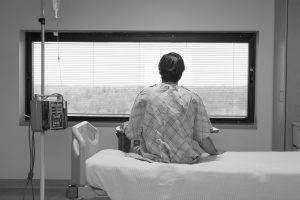Synopsis
 When you look around, you see that society seems to become rougher and tension seems to rise, which causes people to experience more stress. On the other hand, it is also the case that people are annoyed more quickly, causing more conflicts and differences of opinion. Besides that, the costs for healthcare increase, but according to many, its quality decreases. These may not by the primary or only causes of the developments in society, but they are important ones. Although, of course, we cannot influence this directly with the help of classical homeopathy, classical homeopathy can assert a specific indirect influence on how people handle their circumstances. Classical homeopathy can increase the ability to cope and therefore improve the interaction and relationship with other people. Besides that, research shows that homeopathy is cheaper than many other medical therapies and often offers equal or better results. In an ideal world, classical homeopathy would be able to contribute to a better society. So if you are working as a classical homeopath, you will be able to help in building a better community.
When you look around, you see that society seems to become rougher and tension seems to rise, which causes people to experience more stress. On the other hand, it is also the case that people are annoyed more quickly, causing more conflicts and differences of opinion. Besides that, the costs for healthcare increase, but according to many, its quality decreases. These may not by the primary or only causes of the developments in society, but they are important ones. Although, of course, we cannot influence this directly with the help of classical homeopathy, classical homeopathy can assert a specific indirect influence on how people handle their circumstances. Classical homeopathy can increase the ability to cope and therefore improve the interaction and relationship with other people. Besides that, research shows that homeopathy is cheaper than many other medical therapies and often offers equal or better results. In an ideal world, classical homeopathy would be able to contribute to a better society. So if you are working as a classical homeopath, you will be able to help in building a better community.
Society becomes rougher and more intolerant, and healthcare becomes less and less optimal
We notice that society becomes slowly but increasingly harsher in several aspects. Irritation and intolerance increase more and more. According to us, one of the reasons (but not the only reason) is that people are becoming more stressed, more easily irritated by trifles, more overworked, and are subjected to more demands. In itself, these are not medical conditions, but they are consequences of changes in our society.
The tolerance for certain items seems to decrease, and the burden people experience through work, family, relationships, health issues, and other things seem to increase over time. This decrease in tolerance results in, among others, more friction, tension, reduced self-esteem, and a less positive mindset.
 Also, we notice that healthcare becomes more expensive, and this becomes an increasingly pressing issue for many people. We observe a lot of wasting in many ways; that is why it becomes more costly to find solutions for specific health issues. This situation seems to become a bigger problem. Not everyone receives the healthcare someone needs or wishes, just because of financial considerations. Besides that, it is also the case that a lot of healthcare is regulated by rigid protocols and other rules that seem to target significant groups or categories of people, but ignore the individual situation or needs of people. That causes, among others, miscommunication, frustration, waiting times, and other problems. We understand that some things cannot be organized in another way and we still think of the healthcare system as necessary, and many may benefit from it. Still, the fact is that it is not optimal, and many improvements could be made even though Dutch healthcare belongs to the best in the world.
Also, we notice that healthcare becomes more expensive, and this becomes an increasingly pressing issue for many people. We observe a lot of wasting in many ways; that is why it becomes more costly to find solutions for specific health issues. This situation seems to become a bigger problem. Not everyone receives the healthcare someone needs or wishes, just because of financial considerations. Besides that, it is also the case that a lot of healthcare is regulated by rigid protocols and other rules that seem to target significant groups or categories of people, but ignore the individual situation or needs of people. That causes, among others, miscommunication, frustration, waiting times, and other problems. We understand that some things cannot be organized in another way and we still think of the healthcare system as necessary, and many may benefit from it. Still, the fact is that it is not optimal, and many improvements could be made even though Dutch healthcare belongs to the best in the world.
As a classical homeopath, you can contribute to the improvement of society
At first glance, the title of this paragraph can be considered as far-fetched, but there is some truth in it. Classical homeopathy in itself cannot, of course, do anything about alleviating the increasing callousness of society because many factors play a role in this. It is, however, very well possible to help patients to become more balanced, more confident, and improving their overall well being, and cope with the demands and expectations of their environment more effectively. This effect is not the primary goal of homeopathic treatment. Still, during a proper classical homeopathic therapy, we see that patients learn how to understand things in their proper perspective, cope with their circumstances more efficiently, and many more secondary improvements.
 Medical issues can have an influence on the people surrounding the patient
Medical issues can have an influence on the people surrounding the patient
Regularly, a person has several complaints (physical and or psychological), which cause him or her to be very easily irritated. This situation reflects on the rest of the household, family, colleagues, etc. It is not only a one-way street (the people surrounding the patient will have problems with this person’s behavior) but also tensions in the environment influence the patient. A lot is interconnected and influences each other.
It frequently occurs that someone with these complaints goes to a homeopath asking for help. If this homeopath prescribes the proper remedy, the patient does not only notice that the main health issues (for example, rheumatism, sleeping problems, eczema, psoriasis, OCD, or other complaints) alleviate, but he or she also notices other improvements. For instance, there is less frustration, improved coping with setbacks, more understanding, and acceptance of another’s behavior. This effect is not the primary goal of homeopathic treatment, but it very frequently is a beneficial side effect. Because the ability to cope (in short, this means the ability to handle stress, adverse circumstances, adversities, etc.) increases, one also interacts differently with other people like, for example, family, friends, colleagues. It needs no explanation that these changes improve interaction and relationships.
 Just an example: it is not infrequent that a problem like PMS can put a lot of pressure on the relationship. Sometimes this pressure is so significant that the relationship (almost) ends. By treatment by a professional classical homeopath, the patient can experience a substantial decrease in these PMS symptoms (and possible other complaints). Because of this, the pressure in the relationship reduces.
Just an example: it is not infrequent that a problem like PMS can put a lot of pressure on the relationship. Sometimes this pressure is so significant that the relationship (almost) ends. By treatment by a professional classical homeopath, the patient can experience a substantial decrease in these PMS symptoms (and possible other complaints). Because of this, the pressure in the relationship reduces.
Not only this apparent medical complaint can cause this kind of pressure, but also, for example, burnout, depressions, anxiety, memory problems, behavior disorders, irritable bowel syndrome, migraine, seasonal allergies, rheumatoid arthritis, sleep disorders, and many other complaints. Also, think about debilitating diseases like MS, polyneuropathy, cancer, and other conditions where chances of a full recovery are very slim, and treatment is intended to be mainly palliative. Even in these cases, it is possible that classical homeopathy can improve coping and the strength of dealing with the situation.
Some examples of what homeopathy can do
The consequences of these complaints and diseases are evident in these examples, but sometimes the ramifications of the health issues are not that obvious. For instance, during the course, we discuss a video case of a man who, besides some other complaints, also suffers from spontaneous and very sudden and severe diarrhea. Diarrhea in itself is not a problem that many people consider as very restricting and severe (unless in specific severe acute diseases). But in this case, the affliction was so restricting that this patient almost could not leave the house because he was very ashamed of any accidents that happened. He also did not receive friends for visits or went to a restaurant or joined in other social gatherings. He was afflicted with this for about 20 years, and despite the usual medical treatment and medication, it was impossible to bring this under control. Besides this complaint, he suffered a lot from irritability and anger issues: this combination created a situation of social isolation. This person was treated with classical homeopathy.
 After taking the correct remedy, his complaints decreased considerably, the irritation and frustration almost disappeared, just as the diarrhea complaints did. This improvement of health resulted in a much better relationship with his wife, more freedom regarding social aspects of his life, and, of course, a considerable improvement of his previous physical complaints. These complaints stayed away for at least several years (we know this because we stayed in contact with this patient for several years), whereas in the previous 20 years, not one week passed when diarrhea would not trouble him, and not one day was without anger and irritability. It was not necessary to take other remedies, take into account a strict diet, follow psychological counseling, or other forms of therapies or interventions.
After taking the correct remedy, his complaints decreased considerably, the irritation and frustration almost disappeared, just as the diarrhea complaints did. This improvement of health resulted in a much better relationship with his wife, more freedom regarding social aspects of his life, and, of course, a considerable improvement of his previous physical complaints. These complaints stayed away for at least several years (we know this because we stayed in contact with this patient for several years), whereas in the previous 20 years, not one week passed when diarrhea would not trouble him, and not one day was without anger and irritability. It was not necessary to take other remedies, take into account a strict diet, follow psychological counseling, or other forms of therapies or interventions.
Another textbook example is a patient who is, for whatever reason, in a problematic or restricting situation (often for a longer time). Some examples can be a negative relationship, tedious work, conflicts with colleagues, or the patient experiences other things. It often happens that the patient consults a homeopath for specific physical conditions. Still, after taking the correct homeopathic remedy, he or she gets the strength or ability to take the initiative to do something about his or her situation. That does not mean that they always end the relationship or change jobs, but it is also possible that they see other possibilities to mend or improve the situation. We have to remark that a good classical homeopath never provides psychosocial advice, especially not concerning severing a (professional) relationship. We do not know how this is possible, but somehow people find a way by themselves to solve the situation that is the best and most efficient in their position.
Homeopathy treats more than just some symptoms
Probably it has become apparent that treatment with classical homeopathy is more than just removing a complaint or suppressing symptoms. It is more about improving the (general) health. Successful treatment can have more impact than only a reduction of a single complaint. These examples occur in an average clinic quite regularly, providing that the homeopath prescribes the correct remedy for the patient.
Even though the effect of treatment with classical homeopathy is beneficial for the mental-emotional plane, we must stress that this is not the only goal of the treatment. We do not pretend to be coaches or psychotherapists, and it is wrong if a homeopath only focuses on the mental-emotional aspect of the patient and ignoring possible physical complaints. We do not look for something that is not there.
 It is essential that in classical homeopathy, much attention is paid to freedom versus limitation. The severity of being sick is not only defined by the amount of pain, how large a particular eruption is, the frequency of complaints, etc. because this does not do justice to the actual consequences of a condition for a person. The mentioned parameters are not unimportant, but they also do not do sufficient justice to the patient. We take into account the degree of which an affliction restricts the patient in his or her movements, so for one person diarrhea is not the same as for somebody else, because the degree of restriction is different.
It is essential that in classical homeopathy, much attention is paid to freedom versus limitation. The severity of being sick is not only defined by the amount of pain, how large a particular eruption is, the frequency of complaints, etc. because this does not do justice to the actual consequences of a condition for a person. The mentioned parameters are not unimportant, but they also do not do sufficient justice to the patient. We take into account the degree of which an affliction restricts the patient in his or her movements, so for one person diarrhea is not the same as for somebody else, because the degree of restriction is different.
Research that proves that homeopathy can benefit society
According to several pieces of research, it is possible that homeopathy can cause a reduction in expenses in healthcare. Just a random selection of different analyses which prove that:
- From an extensive trial about the efficacy of homeopathy, including 493 patients with chronic afflictions, it became clear that even though the costs in both treatments by medicine or classical homeopathy were equal, the patients treated with homeopathy, in general, had better results. That is a relative reduction of costs (more improvement for the same amount of money).
- The results of another extensive homeopathy trial that lasted four years and included 84 patients were that between £12,48 and £ 703,95 (on average, £60,40) was saved on medical bills for the patients who were treated with homeopathy.
- A trial including 223 patients who were treated homeopathically in a NHS General Practice resulted in a 70% reduction of visits to the family physician and a 50% reduction of costs of medication.
 Another trial showed that physicians who also use homeopathy, prescribe less medication and therefore are more cost-effective. The advice of the researchers is to research this topic more.
Another trial showed that physicians who also use homeopathy, prescribe less medication and therefore are more cost-effective. The advice of the researchers is to research this topic more.- In January 2009, a trial was published that looked at the cost-effectiveness of homeopathy in the treatment of respiratory complaints. It appeared that the cost was reduced by more than 45%. Also, the cost of homeopathic treatment was significantly lower than the cost of mainstream healthcare.
- A trial that included 782 patients showed that 78% of the participants suffered enough from their complaints to have some form of restriction in their daily lives. After homeopathic treatment, more than half of these patients were able to stop their medication. The satisfaction regarding the homeopathic treatment was with 95% of the participants very high (compare this to 20% regarding medical treatment). Noteworthy is that 89% of the participants experienced a significant improvement, 8,5% of the participants experienced no improvement, and 2,4% of the patients experienced an increase in symptoms. The treating physicians reported a similar percentage of the recovery. Compared to regular medical treatment, this was 13% reported improvement, 32% reported no improvement, and 55% reported an increase in symptoms.
Summarising, research shows that classical homeopathy can decrease the costs of healthcare significantly.
Our classical homeopathy course teaches you to cure on a deep level, mild and permanently, taking the patient into account
 One of the most critical aspects of our curriculum is that we put the patient first. That is not just an empty promise, but everything that you will learn in our classes and what you will be doing through the whole course is, in a particular degree, directly connected to what is best for the patient. Respect is essential for the patient, and we teach you how to look at a deeper level at the health of the patient instead of just trying to fix the chief complaint.
One of the most critical aspects of our curriculum is that we put the patient first. That is not just an empty promise, but everything that you will learn in our classes and what you will be doing through the whole course is, in a particular degree, directly connected to what is best for the patient. Respect is essential for the patient, and we teach you how to look at a deeper level at the health of the patient instead of just trying to fix the chief complaint.
One of the things you need to do before starting the actual homeopathic treatment is making a prognosis. In this prognosis, you consider, among other things, in which degree, a patient is restricted, which influences the circumstances to have on the complaints and many other things. In short, you will learn quite early on to take into account many factors concerning the health of the patient. According to us, we mustn’t prescribe stopgap remedies, but we want to prescribe in a thorough and meaningful way for the patient, and because of this, have positive results on his or her surroundings.
According to our philosophy, it should be the prime importance to improve the health of the patient, so he or she is more resistant to all kinds of undermining influences from outside. Only if this does not work, then you could consider working palliatively by treating specific symptoms with, for instance, medication or homeopathic remedies, supplements, exercises, avoiding certain substances. We do not necessarily exclude this.
 Samuel Hahnemann has written a book in which he explained his fundamental principles of classical homeopathy. This book is called the Organon, and in the first paragraph of this book is written:
Samuel Hahnemann has written a book in which he explained his fundamental principles of classical homeopathy. This book is called the Organon, and in the first paragraph of this book is written:
§1 – The physician’s high and only mission is to restore the sick to health, to cure, as it is termed.
Here he writes that we only must improve the health of the patient without speculation and hypothesize. In the second paragraph, it is written that:
§2 – The highest ideal of cure is a rapid, gentle and permanent restoration of the health, or removal and annihilation of the disease in its whole extent, in the shortest, most reliable, and most harmless way, on easily comprehensible principles.
This paragraph illustrates the motivation of Samuel Hahnemann about curing people. He does not start with all kinds of information and theory, but he first begins with the motivation a homeopath should have according to him and the primary criteria a homeopath should fulfill. At the Educational Center for Classical Homeopathy, these values are held in high regard. You will learn during the course to treat mildly, permanently, and according to understandable principles to treat sick people.
Since in our school, the patient is the central focus, and we want to achieve that he or she becomes healthier, we do not teach experimental and hypothetical ideas like the periodic table, family analysis, sensation method, disease classification, homeoprophylaxis, symbolism, C4 trituration, and prescribing several remedies without evaluation in between. These are all currents that have developed during the last approximately 20 years and have (almost) nothing to do with classical homeopathy. Classical homeopathy exists since about 1800, and built a lot of experience since then (also with severe pathology). We are open to new developments, but these new developments should be based on logic, reliable research, and coherent and consistent theory. We do this because we respect the patient and want him or her to be treated as efficiently as possible.
That does not mean that you will not learn about these different developments. We do teach several classes about these developments, but we do this in an objective but discriminative way. Not naively accepting every new development, is a unique feature of our school.
Did this article interest you or do you have any more questions? Please do not hesitate to contact our educational center. If you are enthusiastic and you want to enroll for the course, please fill in the intake form.

